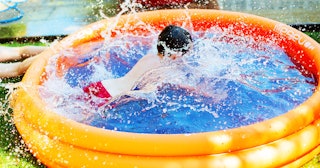Inflatable Pools Are Sold Out Everywhere, And It’s Important To Remember Water Safety And Drowning Risks

For the better part of a decade, I owned a house with a pool in the backyard, and for the better part of a decade, my father-in-law told me he laid awake at night worrying that one of the kids would fall into the pool, that some tragic accident would happen because accidents happen even when everyone does everything perfectly. (And really, who can do everything perfectly?) When I sold and moved out of that house—for a variety of reasons including that pool upkeep was difficult and expensive—he told me he would finally be able to get a good night’s sleep. I told him I was happy to be rid of the work that comes with a pool.
Then the pandemic hit, and the world shut down—the summer camps and town pools I’d been planning to use to keep my kids busy closed for the foreseeable future, and my kids and I were left looking at each other, wondering what do we do now?
The answer: buy an inflatable pool.
Sally Anscombe/Getty
Within days of clicking “buy now” on Amazon, inflatable pools were sold out. Apparently a large swath of America had the same idea I’d had—to spend a pandemic summer wading in an impermanent pool and trying to make the best out of an imperfect summer.
And suddenly my father-in-law had a reason to stay awake worrying again (sorry). Because just because a pool is an inflatable pool, maybe the kind purchased on Amazon and filled with a hose in the backyard, doesn’t mean the drowning risks aren’t exactly the same as they would be with a more permanent pool.
“Water safety vigilance remains as important as ever, especially in light of ongoing public health concerns and community restrictions related to COVID-19,” said U.S. Consumer Product Safety Commission (CPSC) Acting Chairman Robert Adler, in a press release earlier this year. “Our latest report confirms that most child drownings take place at home during the summer months. This year, with more families spending time at home, the delayed opening of many public pools, and a pause on many traditional group swimming lessons, I urge everyone to take critical safety steps to reverse the upward trend in fatal child drownings.”
According to a report by the CPSC, six percent of all drowning deaths for children under the age of five in 2014-2016 reported to the CPSC staff occurred in portable pools, which are defined as pools that can be set up/taken down or moved to another location with relative ease. Six percent may seem like a low number, but low isn’t zero and when it comes to my child (or your child, or anyone’s child) the only acceptable number is zero.
Which is all to say, inflatable (or portable) pools have risks, just like their more permanent counterparts, and just like their more permanent counterparts, the risks can and should be mitigated.
The CPSC released these guidelines for water safety, which apply to all kinds of pools:
- Never leave a child unattended in or near water, and always designate an adult Water Watcher. This person should not be reading, texting, using a smartphone or be otherwise distracted. In addition to pools and spas, this warning includes bathtubs, buckets, decorative ponds, and fountains.
- If you own a pool or spa, install layers of protection, including a four-sided fence with a self-closing, self-latching gate.
- Learn how to perform CPR on children and adults. Many communities offer online CPR training.
- Learn how to swim and teach your child how to swim.
- Keep children away from pool drains, pipes and other openings to avoid entrapments.
- Ensure any pool and spa you use has drain covers that comply with federal safety standards and if you do not know, ask your pool service provider about safer drain covers.
- Visit the Pool Safely Kids’ Corner to keep children entertained and educated with virtual water safety games and activities.
With respect to portable pools, especially those that aren’t drained and re-filled every morning, which can be quick and easy to set up, safety concerns can easily be overlooked—because they are so quick and easy to set up.
elgrecogrande/Reshot
In The Swim provided these tips to ensure a safe portable pool experience:
- Check with your local Building & Zoning commission to inquire about laws related to portable or soft-sided pools.
- Use pool ladders that have a locking stair or flip-up type of ladder.
- Keep all chairs, tables or any item far away from the pool. Small children may use these to climb up and over the pool side.
- Cover your portable pool when not in use, or drain the pool for extended periods of non-use.
- Lock doors leading out to the pool, for extra safety, add door alarms to all points of egress.
- Teach small children to never use the pool alone.
I’m grateful for my little inflatable pool this summer. My kids may not be able to swim a lap or stretch out on a unicorn shaped float, but I’m grateful they have a safe, social distanced approved place to cool off this summer. But it’s important to remember that a pool is a pool and water safety is important whether that water is in a lake, river, or permanent pool—and yes, even an inflatable pool.
This article was originally published on